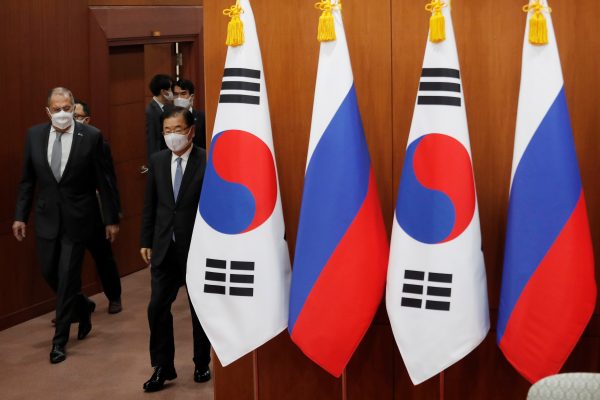South Korea faces a unique situation having to balance the continental and maritime aspects of its geopolitical orientation. Developments in Ukraine underscore the geographic scope of how South Korea’s status as a geopolitical player in Eurasia affects Seoul’s attempts to pursue a commitment to liberalism, as well as narrower national interest.
While the Russia–South Korea bilateral partnership is not the strongest of either Moscow’s or Seoul’s diplomatic relationships, the relationship is generally devoid of overt tensions. Both the Russian and South Korean governments view economics as the mainstay of the relationship, while also bringing political benefits to both sides.
For Russia, access to South Korean investment and technology is crucial for development of the Russian Far East to secure its Northeast Asian periphery. Meanwhile, South Korea views Russia as a gateway to wider Eurasian economic markets.
South Korea is thus watching developments in Ukraine with great interest, particularly given the possibility that the United States could cut off Russia from the SWIFT financial network. This could be devastating for Russia–South Korea trade, especially Russian energy sales. It could also undermine the South Korean automotive industry’s solid presence in Russia, and jeopardise Seoul’s ambitions to ink a free trade agreement with the Eurasian Economic Union.
South Korea’s geopolitical interests with Russia likely won’t factor into any unilateral decision the United States takes vis-à-vis the Ukraine situation. But how the ROK responds to an escalation of the crisis will test South Korea’s strategic alignment with the United States.
Washington’s other ally in the region, Japan, participated in sanctions against Russia following the annexation of Crimea in 2014 and Japanese Prime Minister Fumio Kishida promised full commitment to the U.S. in the event Moscow’s invades Ukraine.
South Korea abstained from punitive actions against Russia following the Crimea annexation, because Seoul desired to maintain diplomatic ties with Moscow.
The current events in Ukraine could put South Korea in a more difficult position compared with 2014, particularly with the perception of South Korea as a ‘weak link’ among US allies. But the lack of vocal South Korean support for Washington against Russia won’t significantly damage the ROK–US alliance, particularly because the perception of South Korea as a potentially unreliable US ally generally applies to the Indo-Pacific. It does confirm views among US policymakers that Seoul is potentially less committed to supporting Washington’s interests.
Events in Ukraine have featured on the campaign trail in South Korea’s upcoming presidential election when ties with Washington arise in debates or questions. Yoon Suk-yeol of the conservative People Power Party has asserted that the specter of a Russian invasion of Ukraine underscores the importance of a liberal South Korea remaining aligned with the United States.
These comments aren’t necessarily indicative of a perception of a direct threat from Russia to the ROK. They do underscore how events in parts of Eurasia can challenge Seoul’s geopolitical and ideological interests. There are hints that South Korea values its relations with Ukraine, particularly where South Korea does not recognise Crimea as being Russian territory.
South Korea cannot afford to remain aloof from developments in distant parts of Eurasia. For now, the biggest risk to Seoul is the potential for factors beyond its control to upset Russia–South Korea relations, which could be detrimental to South Korea’s economic connectivity to the wider Eurasian landmass. At the same time, the ROK may face difficult choices in terms of how to respond to Russian violations of the liberal international order.
Anthony V Rinna is a senior editor for the Sino-NK research group.

